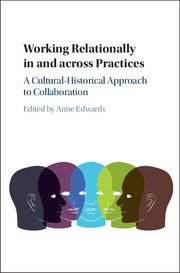Book contents
- Working Relationally In and Across Practices
- Working Relationally in and across Practices
- Copyright page
- Contents
- Notes on Contributors
- 1 Revealing Relational Work
- Part One Working Relationally in the Professions
- Part Two Working Relationally in Networks
- Part Three Working Relationally in Research
- 13 Research as Relational Agency: Expert Ethnographers and the Cultural Force of Technologies
- 14 When Daycare Professionals’ Values for Transition to School Do Not Align with the Educational Demands from Society and School: A Practice Developing Research Project for Daycare Professionals’ Support to Children’s Transition to School
- 15 Relational Approaches to Knowledge Exchange in Social Science Research
- 16 Designing the Epistemic Architecture for Galaxy Zoo: The Case Study of Relational Expertise in Citizen Science
- Epilogue
- Index
- References
16 - Designing the Epistemic Architecture for Galaxy Zoo: The Case Study of Relational Expertise in Citizen Science
from Part Three - Working Relationally in Research
Published online by Cambridge University Press: 28 March 2017
- Working Relationally In and Across Practices
- Working Relationally in and across Practices
- Copyright page
- Contents
- Notes on Contributors
- 1 Revealing Relational Work
- Part One Working Relationally in the Professions
- Part Two Working Relationally in Networks
- Part Three Working Relationally in Research
- 13 Research as Relational Agency: Expert Ethnographers and the Cultural Force of Technologies
- 14 When Daycare Professionals’ Values for Transition to School Do Not Align with the Educational Demands from Society and School: A Practice Developing Research Project for Daycare Professionals’ Support to Children’s Transition to School
- 15 Relational Approaches to Knowledge Exchange in Social Science Research
- 16 Designing the Epistemic Architecture for Galaxy Zoo: The Case Study of Relational Expertise in Citizen Science
- Epilogue
- Index
- References
- Type
- Chapter
- Information
- Working Relationally in and across PracticesA Cultural-Historical Approach to Collaboration, pp. 283 - 296Publisher: Cambridge University PressPrint publication year: 2017

